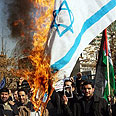
The fighting in Gaza has filled the columns of every international newspaper and reputable news website around the world. International television and radio have provided a sea of analysts to pore over every detail, every inch and every angle of the operation. All the major international organizations such as the United Nations, the European Union and the Arab League are discussing nothing else.
Perhaps this is the point of the whole conflict, and the decision by Hamas not to renew the ceasefire. Conceivably, the conflict was created to divert attention from something else, rather more pressing.
Political Struggle
Persian reformist newspaper accuses Ahmadinejad government of using Palestinian problem 'as weapon' against reformist bodies after shutting down newspaper accused of reporting misinformation about Palestinian fighters in Gaza
The situation has become so desperate that the Arab nations had petitioned the UN to hold meetings on Iran. The five permanent members of the UN Security Council plus Germany agreed to discuss with the Gulf Cooperation Council member states, Egypt, Jordan, and Iraq, the issue of the Iranian nuclear file.
This meeting was extremely crucial for a united front against Iran. One of the Arab attendees stressed that there was a new "understanding" about the threat Iran posed to the region and beyond.
The US, Europe and many others had been pushing for tougher sanctions that would have surely broken the otherwise struggling Iranian economy. Even Russia, faced with such unanimity on the Iranian nuclear issue, could not hold out its opposition to stronger sanctions.
While oil reached the halcyon days of $150 a barrel, Iran could ignore the sanctions as a mere irritant. With oil now hovering around $40 a barrel (and Iran's lower-quality crude selling even cheaper,) disaster is just over the horizon, financial analysts say. Foreign imports will be throttled, incomes will drop, Iran's currency will weaken and inflation will grow even worse. The Iranian government might actually be brought to task and have to concede to prevent harsher sanctions.
This is something that the Iranian regime cannot contemplate; not when it is so close to achieving its nuclear ambitions.
Lost amidst the smoke of the battle in Gaza is a very important report released during the very last days of 2008 by the French Government.
The long-awaited report prepared for the French National Assembly (parliament) and submitted to President Nicolas Sarkozy is the fruit of a bipartisan effort headed by Jean-Louis Bianco, a prominent Socialist Member of Parliament, and senior advisor to President Francois Mitterrand in the 1980s and 1990s.
The report declares unequivocally that Iran is a "short distance" from securing all it needs to make a nuclear warhead.
To differentiate this report and to provide it with an air of authenticity beyond reproach, the findings were based only on facts acknowledged by the Iranians themselves.
This was to become a major tool in convincing the UN Security Council to impose the sanctions that many feel are necessary to bring Iran to heel. However, the report's long-awaited release was lost in the fog of the Gaza conflict.
Iranian fingerprints
The fingerprints of Iran on the latest confrontation are well known. Many in the Arab world have been saying that Iran is playing a major destabilizing role in the region for a while, but some in the West have refused to believe them.
In the words of Dar al-Hayat columnist, Jihad El Khazen, "Iran is playing a disruptive and subversive role on the Palestinian scene; it does not intend through the $25 to $40 million it spends monthly in Gaza to support the Palestinians but rather to use them."
A senior Egyptian diplomat also spoke incredulously about Iran's undue influence on the region. "We seek peace while they shatter it. We want to relieve the suffering of the Palestinian people, while they want it to continue. We want to build a secular, democratic, and stable Lebanon, while they want an Iranian regime and Hizbullah rule there," the diplomat recently told an Arab reporter.
Michael Young, editor-in-chief of Lebanon's Daily Star puts it even more succinctly. "Manipulating the emotions that the fate of the Palestinians invariably releases among Arabs, Tehran is attempting to redraw the regional balance of power," Young wrote.
In Lebanon, Iran's puppet, Hizbullah leader Hassan Nasrallah has been stoking the flames against Israel and those Arab states that are seen as in collusion with Israel and the West.
If the situation in Gaza comes to a halt soon, a ceas-fire is signed or imposed and the world's attention wanes, it is not inconceivable that Hizbullah will be prodded to inflame the northern border.
Perhaps for this very reason Iranian national security chief, Saeed Jalili, has been traveling to Syria and Lebanon, meeting with Hamas leader Khaled Mashaal and Nasrallah respectively. This is reminiscent of Iranian Expediency Council chairman and former IRGC commander Mohsen Rezai's stay in Lebanon throughout the 2006 Lebanon war while supervising Hizbullah's operations.
Recently, the Syrian daily, Al-Watan reported that the Lebanese border with Israel is being monitored closely by both the Lebanese army and UNIFIL to prevent a flare-up.
Iran has a great vested interest in destabilizing the region and diverting attention from the real threat of its nuclear ambitions.
It is incredulous that while the world is glued to a conflict involving a few hundred casualties, a threat to hundreds of millions, even to much of Europe, is being ignored.
However, Iran has long understood the internationally emotive buttons and how to use its pawns in the region. It is perhaps time for the international community to understand the ploy and return with full force to the pressing issue at hand: the Iranian nuclear threat.
The writer is an editor at the Jerusalem Center for Public Affairs for the Middle East Strategic Information project www.mesi.org.uk

Anti-Israel rally in Tehran
Photo: AP
מומלצים















